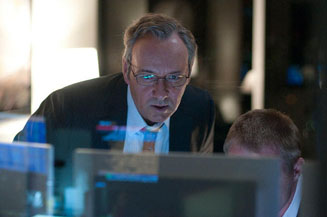Top 10 Film Industry Stories of 2011: #7
Margin Call Proves Viability of Day and Date Video on Demand
By David Mumpower
December 27, 2011
The equally fascinating aspect of Margin Call’s release is that its VOD popularity in no way impinged upon its box office revenue. Effectively blackballed by major exhibitors, the title only had two avenues for theatrical release. AMC Entertainment is the only member of NATO that will even consider booking a day and date VOD title. This forced the producers of Margin Call to explore contracts with independent theater chains, a savvy strategy that has been discussed in prior Film Industry Stories of the Year topics. Oftentimes shut out by major distributors, these indie theaters are the perfect match for indie films yet the two groups do not sync up on a frequent basis.
In creating an irregular amalgam of exhibitions, Margin Call was able to debut in a modest 56 locations but eventually expanded into 199 play dates, never achieving box office higher than $562,000 in a single weekend. Over a two month period in theaters, it methodically earned $5.1 million, thereby exceeding its VOD receipts. The end result is that a movie made for $3.4 million grossed over $9 million through two very different means of exhibition. The established one was slightly more lucrative but it was effectively matched by a desperate usage of VOD in order to boost revenue. The end result is that with very little marketing and virtually no notification of its availability on VOD, Margin Call became a modest financial triumph.
I am not exaggerating when I confidently state that the novel release strategy of Margin Call could fundamentally change the way low budget movies are distributed. This corollary to the previously discussed Tower Heist story is even more significant due to what it represents. As was mentioned in that Film Industry Story, everyone in the industry accepts on some fundamental level that content creators will one day soon sell directly to their customers. Until then, they are constantly searching for ways to cut a better deal, one that keeps a larger portion of revenue in-house.
Since the inception of the movie distribution system, there was a third party involved, the movie theater. The symbiotic relationship between the distributor and the theater has evolved over the decades as emerging markets such as network television, cable television, videocassettes, DVDs and eventually video on demand all increased earning potential. None of this has weakened movie theaters significantly enough for them to stop building cinematic cathedrals. But the industry is always looking for those cracks in the foundation that may prove to be the early warning signal for cataclysmic change.
Now that the results for Margin Call are well publicized, movie executives in all phases of the industry are studiously investigating whether this model is sustainable. And if it is, the question becomes whether it is only possible for small scale titles or if the Tower Heist plan is viable. The key differences between the two titles are straightforward. Tower Heist is a major distributor’s release and if it had worked, that strategy would have become the new normal in the industry. Margin Call is made by a nascent production company who are not guaranteed to release another noteworthy movie in their existence (although based upon the splendid quality of Margin Call, this seems unlikely). Their achievement on this project is easier to dismiss since they are virtual unknowns.
The only difference is one of sticker shock. $7.99 is roughly the average movie ticket cost in North America. At that price point, anyone who wants to see a movie but doesn’t want to put on pants (I’m presuming that’s most of you) is a potential customer. At $59.99, the announced price point for Tower Heist, a person could buy half a dozen Blu-Rays at Amazon.
This isn’t accidental. As I mentioned during the Tower Heist conversation, the reason Universal chooses that number is to insure that exhibitors are not originally threatened by it just as the exhibitors threatened a boycott because they knew that $59.99 would never hold as the price. The basic foundation of movie going has started to crumble as home (and cell/tablet) streaming/downloading becomes more and more tenable. We have witnessed this with Netflix. The attempt with Tower Heist and the accomplishment of Margin Call are further data points that we are moving toward a “watch any movie, anywhere, anytime” society.
Continued:
1
2




